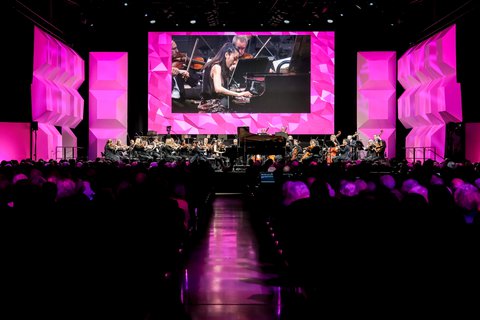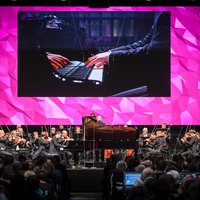The Ukrainian conductor is set to bring star power to the final of the upcoming Telekom Beethoven Competition. In this interview, she discusses how she will support the finalists and explains how the competition promotes Beethoven’s significance worldwide.
5 Questions for ...
Oksana Lyniv

1. What does conducting Beethoven in Bonn mean to you?
Bonn is a city where Beethoven’s spirit is palpably present, both as a composer and as an exceptional individual. The Telekom Beethoven Competition plays an important role in keeping his legacy and tradition relevant in the present day. Young people from all over the world and from different cultures and continents come to the competition to showcase their talents and to become part of this tradition. So, as they say: »Ludwig lives« – and that is truly the case.
2. You are conducting the final of an international piano competition. Is your role different from that in ordinary concerts?
I always have to consider that each finalist has different experience of playing with an orchestra; some have performed their concertos several times before, while others may be making their debut here. During rehearsals, I will support the soloists as best I can, helping them develop their interpretation while maintaining close contact with the orchestra.
3. How do you prepare for working with the finalists? Is there an opportunity to get to know them or rehearse with them in advance?
The finalists’ names are not confirmed until late in the process, so I am currently preparing for the entire specified repertoire. We will have a rehearsal with the selected candidates, followed by a rehearsal with the orchestra, and finally the performance itself. Therefore, the time for working together is limited. At the final concert, the participants will confirm their success in the competition, and I want to support them as much as possible.

4. In the final, the candidates will perform a piano concerto by Beethoven. What challenges does this repertoire present, and what associations do you have with these works?
The finalists must prove themselves in this well-known repertoire, offering a personal and convincing interpretation. I am very excited to see how they perform.
Beethoven's piano concertos reflect his life story in a unique way, with all its highs and lows. As a brilliant concert pianist, he performed his own concertos and conducted from the piano. Unlike today, playing without a conductor was common practice at the time. In a concerto, the dialogue between soloist and orchestra can become challenging if the orchestra does not follow the subtle nuances of the interpretation, such as the desired tempos. That's why we have to tune in to each other quickly.
5. What are your hopes for the young pianists, and for the future of classical music?
I hope that winning the competition will provide an important impetus for the further artistic development of the prizewinners.
Beethoven was one of the most important figures of his time. Through his concept of ›absolute music‹, he encapsulated the intellectual shifts of his era. He was one of the first national artists. I believe that his music expressed sentiments that could not yet be articulated. It conveyed a hope that united people. I hope that classical music will remain relevant in the future and continue to show us the way to humanity.
Oksana Lyniv at Telekom Beethoven Competition 2025
- , Telekom Forum
Orchestra Final
Telekom Beethoven CompetitionJonas Stark, Amir Ron, Seth Schultheis
